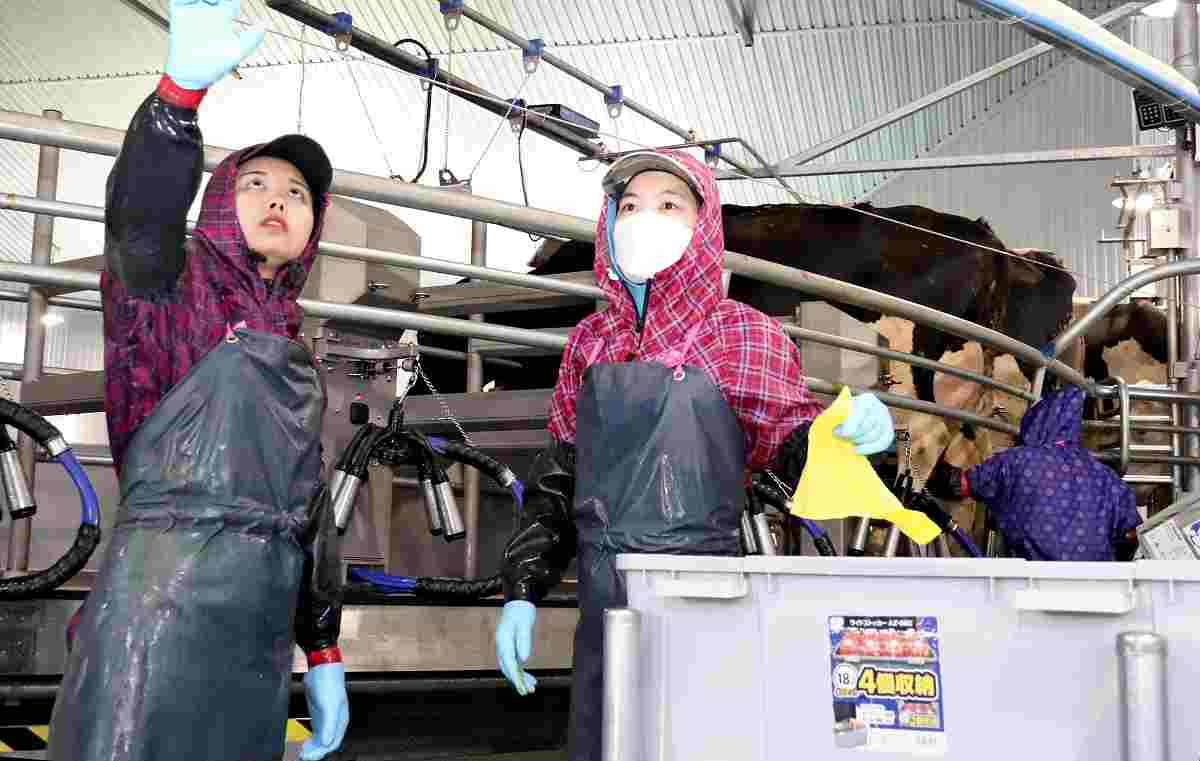
Women, including a technical trainee from Vietnam, start a process to milk cows in Toyokoro, Hokkaido, on Friday.
20:00 JST, April 29, 2023
Creating a system to secure foreign personnel for Japan faces many challenges, especially when it comes to building programs that will benefit foreign workers and the companies that accept them.
An interim report compiled Friday by a government panel called for the abolishment of the technical intern training program. The new system in its place should focus on securing human resources rather than merely “making a global contribution,” the report said.
The technical intern training program has been in place for about 30 years and has made its mark in towns such as Toyokoro, Hokkaido, in the vast Tokachi Plain. With a population of about 3,000, foreign nationals are valuable workers here.
On Friday morning, three Vietnamese women quietly began milking cows on a 480-hectare dairy farm where about 900 cows are raised. Watching over them was Hideyuki Inoshita, 64, who runs the farm.
“Foreign workers are the only ones we can count on,” he said.
The farm began hiring foreign nationals about 15 years ago. Currently, nine Vietnamese, including five technical intern trainees, work there. Yet the staffing shortage has not been resolved.
This is because urban areas with relatively high wages appear more attractive to foreign workers.
“While it is necessary to make efforts on the company side to become a workplace of choice, we want the government to consider promoting provincial areas as well,” Inoshita said.
The panel, chaired by Japan International Cooperation Agency President Akihiko Tanaka, attached importance to “securing human resources” in the interim report to resolve the contradiction between the current system’s objective of international contribution and the reality of the current situation, as an increasing number of sectors, including agriculture and manufacturing, have been suffering from chronic labor shortages.
Although the technical intern training program will be abolished, the current framework for accepting foreign trainees will be maintained even under the new system. It is expected that technical intern trainees now working in Japan will be able to work under the new system.
The specific design of the new system, including how the supporting programs should be, will be the task from now on.
Some have pointed out that the new system should not end up being only a change of name.
Only 10 type 2 workers
The panel has also urged the creation of a system to facilitate the smooth transition of trainees to the residence status of specified skilled worker, which was introduced in 2019, for personnel who have developed their skills to the point that they can become immediate assets. As of the end of last year, there were approximately 130,000 foreign nationals working under the status of specified skilled worker.
The technical intern training program, as of the end of June 2022, had about 320,000 foreign nationals working under the system. The maximum period of residency under the program is five years. The panel’s idea is that in the future the trainees can aim to advance in their careers to obtain, in stages, the residence status of specified skilled worker type 1, which allows a maximum residency period of five years, and the status of type 2, which effectively allows permanent residency. By doing so, it will enable the foreign nationals to work in Japan for a longer period.
The government also intends to expand the fields of occupations covered by the status of specified skilled workers type 2 to include agriculture and food service.
As of the end of February, however, the number of foreign nationals with the residency status of specialized skilled worker type 2 remained at 10. The hurdles to obtain the status are high, as it requires skills at a proficient level.
Based on the final report to be compiled by the panel by this fall, the government intends to submit a related bill to the ordinary Diet session next year to establish a new system.
“It is essential to also solidly consider the long-term prospects, including how the acceptance of foreign workers would impact the Japanese economy and society in the future,” said Kiyoto Tanno, a professor of labor sociology at Tokyo Metropolitan University.
Top Articles in Society
-

Producer Behind Pop Group XG Arrested for Cocaine Possession
-

Man Infected with Measles Reportedly Dined at Restaurant in Tokyo Station
-

Man Infected with Measles May Have Come in Contact with Many People in Tokyo, Went to Store, Restaurant Around When Symptoms Emerged
-

Woman with Measles Visited Hospital in Tokyo Multiple Times Before Being Diagnosed with Disease
-

Australian Woman Dies After Mishap on Ski Lift in Nagano Prefecture
JN ACCESS RANKING
-

Producer Behind Pop Group XG Arrested for Cocaine Possession
-

Japan PM Takaichi’s Cabinet Resigns en Masse
-

Man Infected with Measles Reportedly Dined at Restaurant in Tokyo Station
-

Israeli Ambassador to Japan Speaks about Japan’s Role in the Reconstruction of Gaza
-

Videos Plagiarized, Reposted with False Subtitles Claiming ‘Ryukyu Belongs to China’; Anti-China False Information Also Posted in Japan























